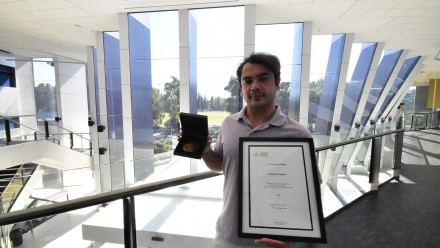A Novel Haematopoietic Stem Cell-derived method to promote neurorepair in the central nervous system: Implications for progressive MS
Multiple Sclerosis (MS) is an immune-mediated neurodegenerative disorder. Nogo receptor 1 (NgR1) is a high affinity receptor for myelin-associated inhibitory factors (MAIFs) to abrogate neurite outgrowth and may promote axonal degeneration in an animal model of MS, experimental autoimmune encephalomyelitis (EAE). HSCs can be utilised as carriers of the therapeutic NgR(310)ecto-Fc decoy protein for specific delivery into EAE lesions and can potentiate neurological recovery. As MS and EAE exhibit large numbers of inflammatory cell infiltrates to potentiate oligodendrocyte dystrophy and central nervous system (CNS) demyelinating lesions, we utilised transplantable HSCs as a cellular delivery method of the NgR(310)ecto-Fc fusion protein. We show that we can deliver NgR(310)ecto-Fc to sites of EAE pathology following the transplantation of lentivirus (LV)-transduced HSCs that encode the fusion protein. We identified infiltrating macrophages expressing NgR-Fc localised to areas of inflammation and demyelination (2.0 x 103 ± 0.5 x 103 cells/mm2, p<0.0001), at the peak of neurological disability. Importantly, mice transplanted with HSCs overexpressing the therapeutic NgR(310)ecto-Fc protein, recovered from symptoms associated with EAE demonstrating axonal regrowth and remyelination. Our results suggest that HSCs can be utilised as carriers of the therapeutic NgR-Fc protein delivered to EAE lesions and can potentiate neurological recovery through neurorepair.
Dr Steven Petratos is a Senior Lecturer and Head of the Regenerative Neuroscience and Development Laboratory, in the Department of Neuroscience, Central Clinical School at Monash University. Dr Petratos devised and implemented the new Translational Research Doctoral program for the Clinical Schools at Monash University. Dr Petratos earned his Bachelor of Science with Honours from the University of Melbourne and his PhD in Pathology from the University of Melbourne. He completed postdoctoral training at the Walter and Eliza Hall Institute, the Howard Florey Institute both at the University of Melbourne, as well as the Department of Biochemistry and Molecular Biology at Monash University, with a focus on the neurobiology of demyelination and remyelination. He now leads a research team that focuses on overcoming axonal degeneration in multiple sclerosis as well as identifying novel strategies to repair myelin. His work in the field of demyelination has earned him recognition from Commonwealth AIDS Research Grants Scholarship, Faculty of Medicine Monash University Postdoctoral and Senior Research Fellowships, and project grants from the National Multiple Sclerosis Society (US), Progressive MS Alliance, Multiple Sclerosis Research Australia, Trish MS Research Foundation, Bethlehem Griffiths Research Foundation, along with numerous commercial engagements.
Over the past few years Dr Petratos has been involved in industry-based (translational research) projects and is currently in negotiations to commercialise a novel drug for MS.












